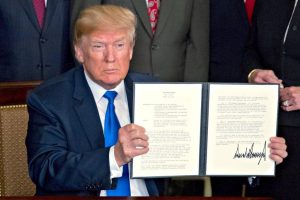By Antonia Vanzini

The risks of a trade war between China and the U.S. are increasing, especially after President Trump’s decision to introduce a new tariff on steel and aluminium imports in early March.
China’s response came soon afterward. A tweet from the People’s Daily, an English-language news organization controlled by the Chinese government, reported that: “China imposes tariffs on 128 items of imports from the U.S. including pork and fruit products starting Monday as a countermeasure in response to a previous U.S. move to slap tariffs on steel and aluminum imports.”
This action is what economists call retaliation: a nation’s direct reaction to a trading partner’s restrictive measure that results in the economic world being worse off after this decision than it was before.
What should President Trump do to prevent U.S. producers from losing their profits at the expense of the Chinese counterpart?
First of all, a formal meeting between U.S. representatives and Xi Jinping, the Chinese leader, could be an initial solution.
Instead of continuously introducing new direct restrictions and barriers to international trade, diplomatic confrontations could lead to multilateral agreements. These agreements would avoid all the negative consequences of retaliation-that, in most cases, result from this lack of direct political confrontations.
Moreover, the president should ask his advisers to create a dispute resolution mechanism: a process that would address large-scale conflicts and hopefully offer a revolution in the form of a mutual trade agreement.
In fact, Chinese trade policies have led to the closure of 60,000 factories and the loss of six million jobs in the United States alone.
After this new tariff on imported steel and aluminium products, China would preferentially purchase those goods from South America, Europe or elsewhere, rather than from our national exporters.
An approach totally in favor of protectionism as Trump’s decision seems like would not be successful. Protectionist measures can effectively reduce levels of national unemployment and cure deficits in a nation’s balance of payments.
However, this course of action is only successful if the trading partner does not retaliate. As evident by the country’s imposition of the tariff on pork and fruit. This course of action is not what we should expect from the Chinese government and the Chinese Minister of Finance.
The president should adopt a more consistent and clear plan: as we all know, he changed his mind several times on the matter of trade policy. During the 2016 political campaign, he used a populist trade rhetoric and called for the implementation of U.S. trade laws that could enhance international growth and economic interdependence among trading countries.
From what we can see now, he is adopting a completely different strategy with China by supporting protectionism and the creation of tighter trade barriers.
He should find a way to protect domestic economy from worldwide competition while also engaging in international free trade.
Finally, we should consider the consequences that ending trade with China would surely have.
Although data confirm, as President Trump says that the U.S. would undoubtedly win a trade war with China financially, the decision of applying further barriers to trade would negatively impact U.S. producers and consumers.
Exports to the Chinese market represent 0.6% of the U.S. GDP, so export restraints to the Middle Eastern partner would not largely impact the total value of the American gross domestic product.
Ending this economic partnership would not hurt our economy if we don’t analyze past figures and values; if we go deeper, we understand that economics is not just a matter of numbers. In fact, when we start analyzing the national market, we immediately see how a reduction in the total amount of exports would cause job losses and higher prices for consumers.
Any political measure in the economic sector should take into account the impact on the subjects that make economic transactions possible: people.
If the president gave more importance to the human side of the matter, he would not believe protectionism to be the only possible way to solve it.
Antonia Vanzini, from Catholic University of Sacred Heart, is an International Relations and Languages major from Milan, Italy.






































































































































































































